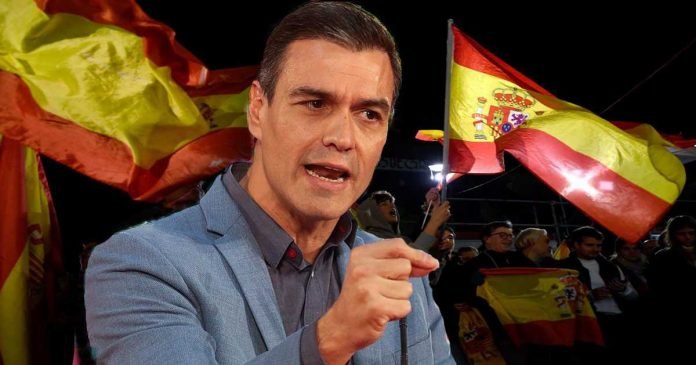The Spanish Socialist Workers Party (PSOE) won Spain’s election Sunday with 120 seats, but fell short of gaining the parliamentary majority.
“We’ve won the election and we’re going to work for a progressive government as of tomorrow,” Sánchez told supporters at the party’s headquarters in Madrid.
“Our project is to form a stable progressive government led by the @PSOE to make policies for the benefit of the majority,” acting Prime Minister and PSOE leader Pedro Sanchez said in a tweet. “All Parties must act with generosity and responsibility starting tomorrow to unlock the country.”
The conservative Popular Party (PP) closed the gap on the Socialists, winning 88 seats, up from 66 in April, and the far-right, anti-immigration Vox party vaulted into third place, more than doubling its seat count to 52, and taking over 15 percent of the vote in a dramatic realignment among parties on the right.
The result leaves Sánchez as the only viable candidate for prime minister, but his chances of forming a working coalition appear more difficult even than after the April election, and he may need to rely either on some form of understanding with the conservatives or on the backing of the far-left Unidas Podemos — down from 42 seats to 35 — and Catalan pro-independence parties. The liberal Ciudadanos slumped to sixth place, losing 47 of its 57 seats.
National parties on the left won a combined 158 seats, while parties to the right won a combined 150 — both some way short of a majority.
Still, any left-wing coalition would be more reliant on Catalan independence parties than after April — and thus more unstable.
The relevance of Catalonia’s conflict
The rise of Vox can be linked to the Catalan independence movement, which has been intensified in the last month after the announcement of the sencente that condemned to prison the separatist Catalan politicians.
The vote in Catalonia had relevant role in this election. Often, the formation of the National Executive has been decided thanks to the votes of Catalonia, something of which the Catalans are aware, although this time they go to the polls even more divided than in the previous elections.
At the national level, the crisis in the region could provoke a shift to the right and even to the extreme right by the antiseparatist rhetoric of its candidates to respond to the radicalisation of a sector of independence following the Supreme Court’s sentencing of 12 separatist leaders.
The electoral campaign was marked by street protests by independence supporters in Catalonia — sparked by the conviction of nine Catalan leaders to up to 13 years in prison for spearheading the region’s failed secession push in 2017. That arguably played into the hands of both Vox and secessionist parties in the region.
Catalan secessionist parties won 42 percent of the vote — a historic high for a national election — and 48 percent of the seats in Catalonia on Sunday.
Sánchez seized power in June 2018, when he won a motion of no-confidence in his conservative predecessor Mariano Rajoy with the help of Podemos and Basque and Catalan nationalists.
The Socialists won the April general election with 29 percent of the vote and 123 seats in Congress, but could not secure majority backing in the parliament either with the help of the left or the right — leading to Sunday’s vote.
The rise of the far-right in Spain
Far-right Vox more than doubles its seats, as Sánchez’s gamble leaves country still divided.
Spain, along with Portugal, where a rare case in the European Union as they did not have far-right parties represented in their parliament. However, in the elections of April 28th Spain was no longer the exception and the Vox party burst into Congress with 24 deputies,
In November, the party led by Santiago Abascal doubled its number of seats and became the country’s third-largest force. Behind this good result is the intensification of the independence struggle in the streets due to the publication of the sentence to the Catalan independence politicians in prison.
Spain’s political landscape was traditionally dominated by the Socialists and the conservative PP, but became increasingly fragmented in the years since the financial crisis with the rise of Podemos and Ciudadanos.
Further cracks emerged over Catalonia’s push for independence, and as Vox made its entrance onto the national scene in April.
Support Independent Journalism Today
Our unwavering dedication is to provide you with unbiased news, diverse perspectives, and insightful opinions. We're on a mission to ensure that those in positions of power are held accountable for their actions, but we can't do it alone. Labour Heartlands is primarily funded by me, Paul Knaggs, and by the generous contributions of readers like you. Your donations keep us going and help us uphold the principles of independent journalism. Join us in our quest for truth, transparency, and accountability – donate today and be a part of our mission!
Like everyone else, we're facing challenges, and we need your help to stay online and continue providing crucial journalism. Every contribution, no matter how small, goes a long way in helping us thrive. By becoming one of our donors, you become a vital part of our mission to uncover the truth and uphold the values of democracy.
While we maintain our independence from political affiliations, we stand united against corruption, injustice, and the erosion of free speech, truth, and democracy. We believe in the power of accurate information in a democracy, and we consider facts non-negotiable.
Your support, no matter the amount, can make a significant impact. Together, we can make a difference and continue our journey toward a more informed and just society.
Thank you for supporting Labour Heartlands









